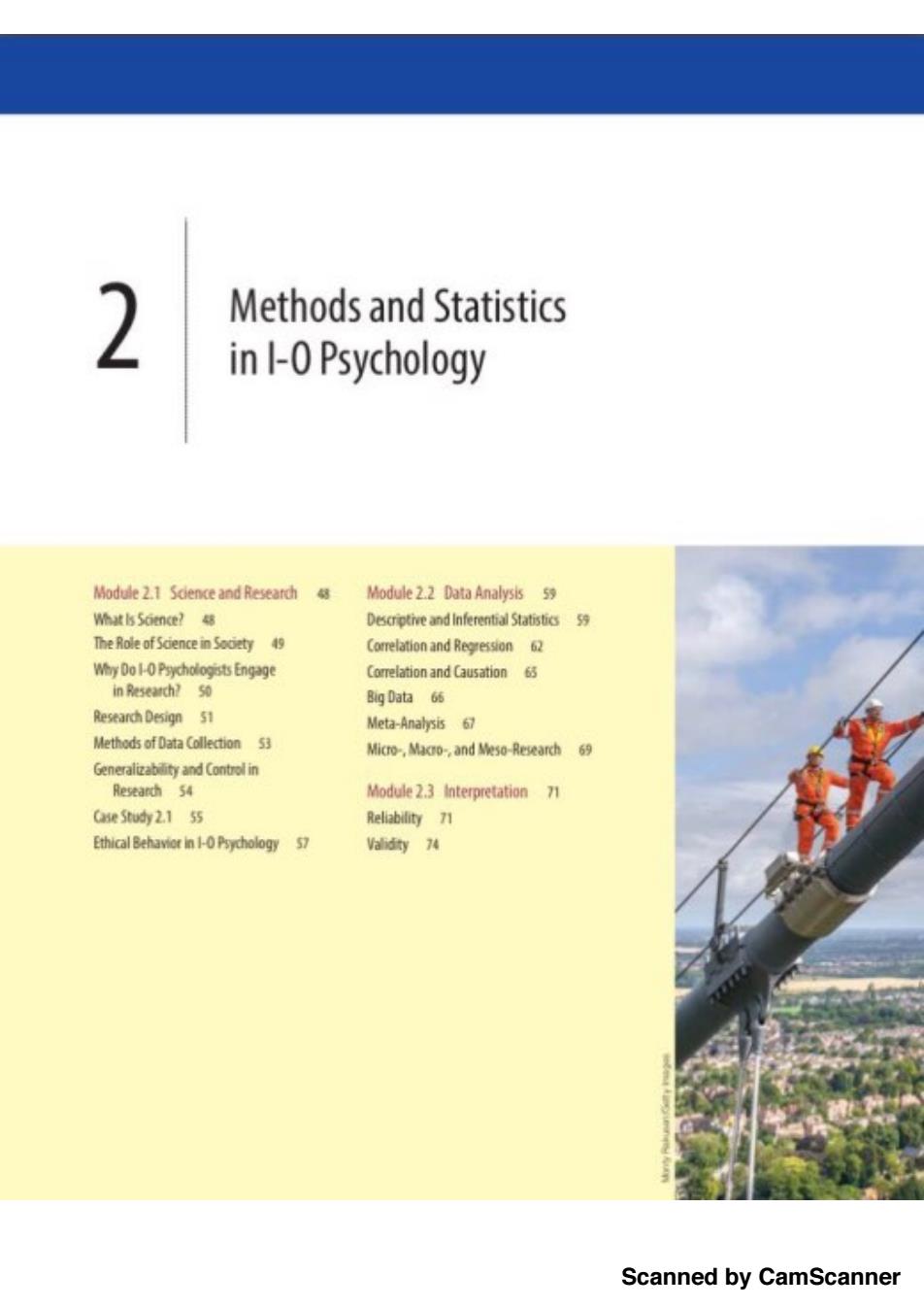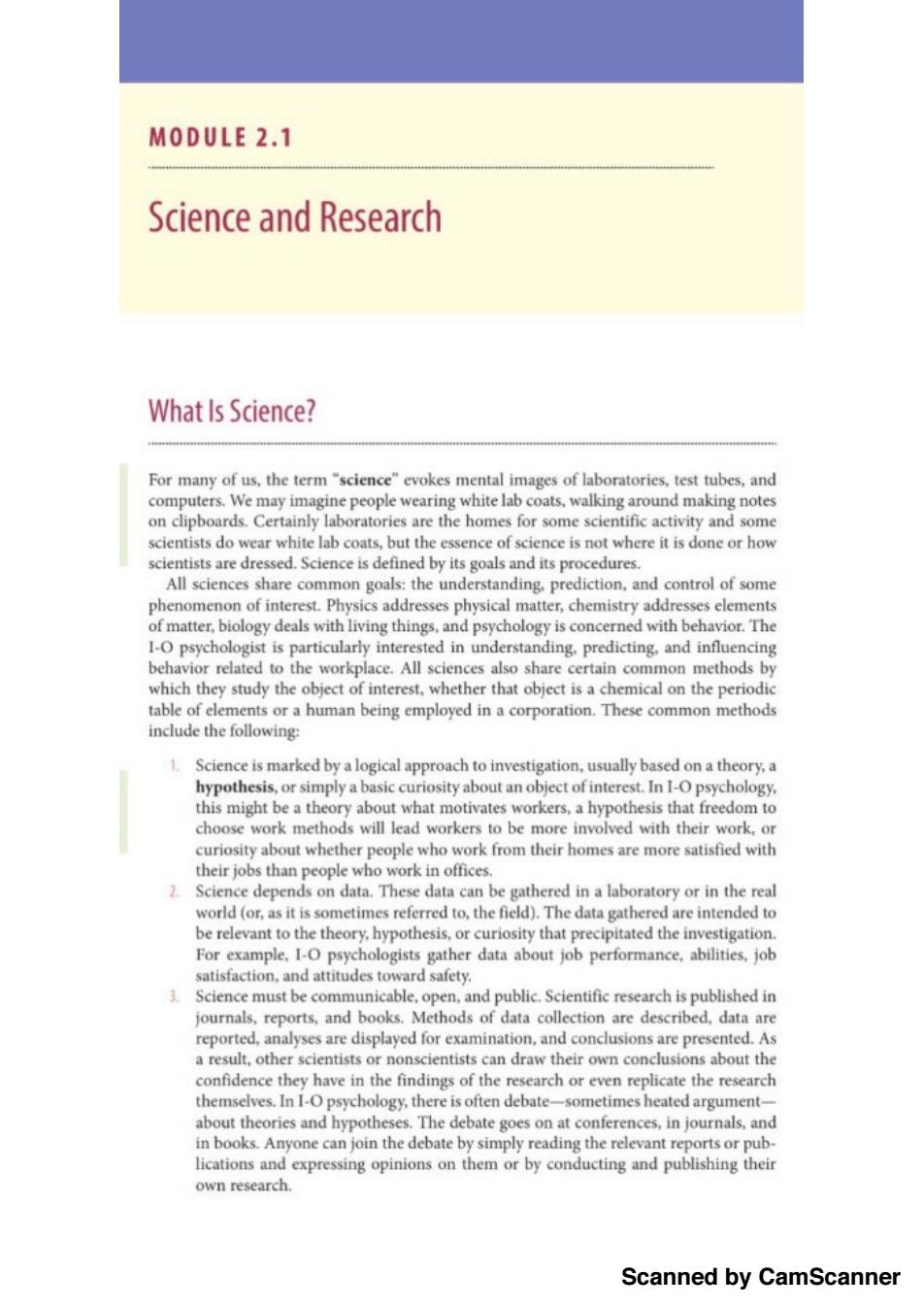
2 Methods and Statistics in I-0 Psychology Module 2.1 Scence and Research Module 2.2 Data Analysis 59 Mts5one}结 Descriptive and Inferential Statistics The Role of Scencein Socety 49 Correlation and Regression 62 Wy Do1-0 Psychologists Engage Correlation and Causation 65 in Research?50 Big Data 65 Research Design 51 Meta-Analysis 6 Methods of Data Collection 53 Micro-,Macro-,and Meso-Research69 Generalizability and Control in Research 54 Module 2.3 Interpretation 71 0e3u2155 Reliab的y71 Ethical Behavior in1-0 Psychology 57 Validity 74 Scanned by CamScanner
Scanned by CamScanner

2 Methods and Statistics in I-0 Psychology Module 2.1 Science and Research 48 Module 2.2 Data Analysis 59 What Is Science?48 Descriptive and Inferential Statistics 59 The Role of Science in Society 49 Correlation and Regression 62 Why Do l-0 Psychologists Engage Correlation and Causation 65 in Research?50 Big Data 66 Research Design 51 Meta-Analysis 67 Methods of Data Collection 53 Micro-,Macro-,and Meso-Research 69 Generalizability and Control in Research 54 Module 2.3 Interpretation 71 Case Study 2.1 55 Reliability 71 Ethical Behavior in 1-0 Psychology 57 Validity 74 Scanned by CamScanner
Scanned by CamScanner

MODULE 2.1 Science and Research What Is Science? For many of us,the term "science"evokes mental images of laboratories,test tubes,and computers.We may imagine people wearing white lab coats,walking around making notes on clipboards.Certainly laboratories are the homes for some scientific activity and some scientists do wear white lab coats,but the essence of science is not where it is done or how scientists are dressed.Science is defined by its goals and its procedures. All sciences share common goals:the understanding,prediction,and control of some phenomenon of interest.Physics addresses physical matter,chemistry addresses elements of matter,biology deals with living things,and psychology is concerned with behavior.The 1-O psychologist is particularly interested in understanding.predicting,and influencing behavior related to the workplace.All sciences also share certain common methods by which they study the object of interest,whether that object is a chemical on the periodic table of elements or a human being employed in a corporation.These common methods include the following: 1.Science is marked by a logical approach to investigation,usually based on a theory,a hypothesis,or simply a basic curiosity about an object of interest.In I-O psychology, this might be a theory about what motivates workers,a hypothesis that freedom to choose work methods will lead workers to be more involved with their work,or curiosity about whether people who work from their homes are more satisfied with their jobs than people who work in offices. Science depends on data.These data can be gathered in a laboratory or in the real world (or,as it is sometimes referred to,the field).The data gathered are intended to be relevant to the theory.hypothesis,or curiosity that precipitated the investigation. For example,I-O psychologists gather data about job performance,abilities,job satisfaction,and attitudes toward safety. 3 Science must be communicable,open,and public.Scientific research is published in journals,reports,and books.Methods of data collection are described,data are reported,analyses are displayed for examination,and conclusions are presented.As a result,other scientists or nonscientists can draw their own conclusions about the confidence they have in the findings of the research or even replicate the research themselves.In I-O psychology,there is often debate-sometimes heated argument- about theories and hypotheses.The debate goes on at conferences,in journals,and in books.Anyone can join the debate by simply reading the relevant reports or pub- lications and expressing opinions on them or by conducting and publishing their own research. Scanned by CamScanner
Scanned by CamScanner

2.1 4 Science does not set out to prove theories or hypotheses.It sets out to disprove them. The goal of the scientist is to design a research project that will eliminate all plausible explanations for a phenomenon except one.The explanation that cannot be dis- proved or eliminated is the ultimate explanation of the phenomenon.For example, in lawsuits involving layoffs brought by older employees who have lost their jobs.the charge will be that the layoffs were caused by age discrimination on the part of the employer.A scientific approach to the question would consider that possibility,as well as the possibility that the layoffs were the result of: Differences in the past performance of the individuals who were laid off Differences in the skills possessed by the individuals Differences in projected work for the individuals Differences in training,education,or credentials of the individuals One other characteristic of science that is frequently mentioned (MacCoun,1998; Merton,1973)is that of disinterestedness-the expectation that scientists will be objective and not influenced by biases or prejudices.Although most researchers are, and should be,passionately interested in their research efforts,they are expected to be dispassionate about the results they expect that research to yield-or,at the very least,to make public any biases or prejudices they may harbor. It will become apparent as we move through the chapters of this book that I-O psychology is a science.I-O psychologists conduct research based on theories and hypotheses.They gather data,publish those data,and design their research in a way that eliminates alternative explanations for the research results.I-O psychologists (and scientists in general)are not very different from nonscientists in their curiosity or the way they form theories,hypotheses, or speculations.What sets them apart as scientists is the method they use. The Role of Science in Society We are often unaware of the impact that science has on our everyday lives.The water we drink,the air we breathe,even the levels of noise we experience have been influenced by decades of scientific research.Consider the challenge faced by a pharmaceutical company that wants to make a new drug available to the public.The Food and Drug Administration (FDA)requires the pharmaceutical company to conduct years of trials(experiments)in the laboratory and in the field.These trials must conform to the standards of acceptable sci- ence:They will be based on a theory:data will be gathered,compiled,and interpreted;and all alternative explanations for the effects of the drug will be considered.In addition.the data will be available for inspection by the FDA.Before the drug can be released to the public,the FDA must agree that the data show that the drug actually makes a contribution to medicine and that it has no dangerous side effects. As you will see in a later section of this chapter that deals with ethics,the burden of trust- worthy science must be shouldered by a trustworthy scientist.An example is provided by a 2008 congressional inquiry involving the pharmaceutical company Pfizer and its choles- terol drug Lipitor.A Lipitor advertising campaign was launched in 2006 featuring Robert Jarvik,the physician who was famous for developing an artificial heart valve.In one ad, Jarvik was engaged in a vigorous rowing exercise on a lake immediately after endorsing the drug.When the public learned that a stunt double actually did the rowing,the drug and larvik were the objects of immediate criticism.Moreover,it was revealed that although Jarvik held a medical degree,he had never completed the certification necessary to practice medicine.Thus,he was not qualified to give medical advice,which he appeared to be doing in the ads.The inauthentic scientist brought the science into question. Scanned by CamScanner
Scanned by CamScanner

and Statistics in -0 Psychology The importance of the scientific method for the impact of human resource and I-O practices can also be seen in society,particularly in the courts.As we will see in several of the chapters that follow (most notably,Chapter 6),individuals often bring lawsuits against employers for particular practices,such as hiring,firing,pay increases,and harassment.In these lawsuits,1-0 psychologists often testify as expert witnesses.An expert witness,unlike a fact witness,is permitted to voice opinions about practices. An I-O psychologist might be prepared to offer the opinion that an employer was justified in using a test,such as a test of mental ability,for hiring purposes.This opinion may be challenged by opposing lawyers as "junk science"that lacks foundation in legitimate scientific research.You will recall that we described "junk science"in Chapter I as a fascinating topic (un)supported by shoddy research.The scientific method is one of the most commonly accepted methods for protecting individuals from the consequences of uninformed speculation. Why Do I-0 Psychologists Engage in Research? An old truism admonishes that those who do not study history are condemned to repeat it.In Chapter 1,we cautioned that researchers studying emotional intelligence but ignoring earlier research on social intelligence might have been condemned in just that way.A less elegant representation of the same thought was the movie Groundhog Day, in which Bill Murray gets to repeat the events of a particular day over and over again. learning from his mistakes only after a very long time.Without access to scientific research,the individuals who make human resource(HR)decisions in organizations would be in Murray's position,unable to learn from mistakes (and successes)that are already documented.Each HR director would reinvent the wheel,sometimes with good and sometimes with poor results.By conducting research,we are able to develop a model of a system-a theory-and predict the consequences of introducing that system or of modifying a system already in place.Remember that in Chapter I we described the importance of research in the scientist-practitioner model.Even though you may not actually engage in scientific research,you will certainly consume the results of that research. Consider the example of hiring.Imagine that an organization has always used a first- come,first-served model for hiring.When a job opening occurs,the organization advertises,reviews an application blank,does a short unstructured interview,and hires the first applicant who has the minimum credentials.Research in 1-O psychology has demonstrated that this method does not give the employer the best chance of hiring successful employees.An employer that conducts a structured job-related interview, and that also includes explicit assessments of general mental ability and personality,will tend to make better hiring decisions.We can predict this because of decades of published research that form the foundation for our theory of successful hiring.When organizational decision makers decide on a course of action,they are predicting (or anticipating)the outcome of that course of action.The better the research base that employers depend on for that prediction,the more confident they can be in the likely outcome.Both science and business strategy are based on the same principle: predictability.Business leaders prefer to avoid unpleasant surprises;theory and research help them to do so. In most of your course texts,you will be exposed to "theory."Think of theories as either helpful or not helpful,rather than"right"or"wrong."Klein and Zedeck (2004)remind us that theories provide meaning and specify which variables are important and for what Scanned by CamScanner
Scanned by CamScanner